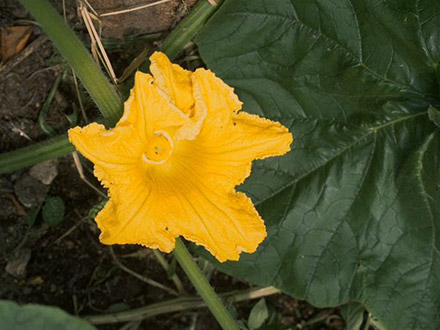Botanical name
Common pumpkin, Vegetable marrow - Cucurbita pepo L.
Family
Cucurbit (Cucurbitaceae)
Information about the plant
The common pumpkin is a very varied species, whose individual forms, however, cannot be geographically localised. There are two subspecies, namely the subspecies pepo, which includes all forms of culture, and the subspecies texana. This is common in Central and Southern Texas and is probably the archetype of the whole species Cucurbita pepo. Pumpkins are now grown worldwide. Its fruits are the largest in the plant world and can weigh up to 25kg. Botanically they are berries because of the hard shell also called "berry armour". The flesh is yellow and spongy, there are numerous pointed oval, flat, greenish white or pale brown seeds up to 2cm long. The fruits are used as a vegetable or pickled sweet and sour, the seeds are used for making the nutty-smelling, green pumpkin oil. The shoots of the pumpkin that grow more than 10m long crawl along the ground or climb in leaf tendrils. The stems are hairy and rough and have large alternate hand shaped leaves, large yellow funnel-shaped, male and female flowers grow from the axils. Cucurbita probably comes from the ancient Indian "Carbhatah" (= cucumber) with a subsequent reduplication (cu-curbita). In combination with the epithet pepo means "ripe cucumber" (Greek "Pepon" = ripe, soft, crumbly).
Medicinally used parts of plants (herbal drug)
The whole, dried, ripe seeds are used. The drug is imported from Eastern European countries, Austria, Hungary and Mexico.
Constituents of the herbal drug
Pumpkin seeds contain a fatty oil, proteins, carbohydrates, phytosterols and tocopherols.
Quality of the drug
The quality of pumpkin seeds (Cucurbita semen) is specified in the German Pharmacopoeia (DAB).
Medical applications
Recognised medical use
For the treatment of an overactive bladder and urination problems in benign prostatic hyperplasia (BPH, also benign prostatic syndrome - also known as BPS) - Stage I-II (Commission E). An area of use defined by clinical data (approval) is: with nocturnal and involuntary urination.
Traditional use
Traditionally used for strengthening and toning the bladder function (traditional use acc. to § 109a).
Herbal drug preparations in finished dosage forms
- powdered pumpkin seeds in capsules and tablets
- dried extract in capsules and tablets
- thick extract in capsules
- pumpkin seed oil in capsules
Dosage
Prepared drugs: see package insert;
Tea infusions are not worthwhile; take 1 to 2 heaped tablespoons (15 to 30g) crushed or chewed pumpkin seeds taken with liquid, in the morning and evening.
Preparation of a tea
N/A
References
Herbal drug monographs
Further literature
Wichtl: Teedrogen und Phytopharmaka, pg. 207
Schilcher: Leitfaden Phytotherapie, pg. 158
Van Wyk: Handbuch der Arzneipflanzen, pg. 117
Kommentar zum Deutschen Arzneibuch (Pumpkin seeds)


